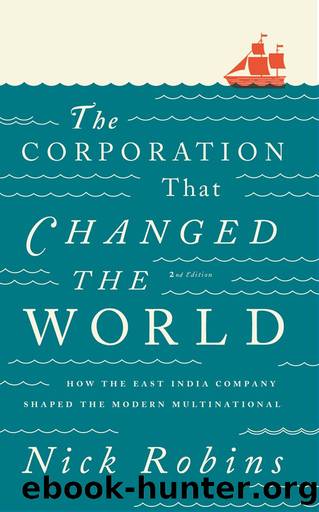The Corporation That Changed the World by Robins Nick.;

Author:Robins, Nick.; [Robins, Nick]
Language: eng
Format: epub
ISBN: 9781849646925
Publisher: Book Network Int'l Limited trading as NBN International (NBNi)
NIBBLING AT THE CHARTER
After the crash of 1772, the overwhelming priority for the Companyâs directors back in London was to pay off the £1.4 million loan from the government and regain financial freedom. Their task was hampered by the rumours of civil war in the Bengal Council that filtered back to England. Scandalised by Nandakumarâs judicial murder and the in-fighting it exposed in the Council, the directors had voted to recall Hastings in the summer of 1776, but they were overruled at a meeting of the Companyâs shareholders. However, Hastingsâs representative in London had used this occasion to tender Hastingsâs resignation in an attempt to secure good terms, which the directors accepted. Of course, when Hastings himself heard of his departure from office the following year, he refused to budge. This stubbornness enflamed passions in London even more, exposing the failure of the Regulating Act to give the state the right to recall the governor-general. King George III demanded that Hastings should be dismissed, and some talked of his impeachment. But war in the Americas took precedence and events in India were allowed to drift. In the meantime the Company successfully paid off its debt in 1776, cut its debt and triumphantly raised its dividend from 6 to 8 per cent.
When news of Haidar Aliâs invasion of the Carnatic reached London in April 1781, this happy situation was quickly overturned. The Company was already in the middle of negotiations with Lord Northâs embattled administration for a renewal of its charter, and this powerful reminder of the Companyâs incompetence strengthened the governmentâs hand. North demanded that the Company should hand over three-quarters of its net profits over what was required to pay the annual 8 per cent dividend, amounting to £600,000 a year. Speaking for the opposition Whigs, Edmund Burke sprung to the Companyâs defence, arguing that this was no more than âa violent and shameless attempt to rob the Company in order to pursue the purposes of the most lavish waste and the most profligate corruptionâ.16 But the Company was desperate for its charter, and in return for another ten yearsâ monopoly it agreed to pay £400,000 up front, as well as three-quarters of the surplus going forward.
This was not the end of the matter. In February, Burke had been appointed to a Parliamentary Select Committee investigating the administration of justice in Bengal. Two months later, Henry Dundas, the 39-year-old rising star of the Scottish elite, was charged with leading a parallel Secret Committee into the Carnatic affair. Just as in 1773, the Company was facing a two-pronged parliamentary assault. Over the next two years, these twin investigations would make 17 reports to Parliament, exposing the Company and laying the foundations for its subordination to the state. Although they were political adversaries, Burke and Dundas shared much of the same analysis concerning the roots of the problem. Where they differed was over which institution should have the whip-hand. For Dundas, the Crown should be in the driving seat, but for Burke, it was clear that the Company should be accountable to Parliament.
Download
This site does not store any files on its server. We only index and link to content provided by other sites. Please contact the content providers to delete copyright contents if any and email us, we'll remove relevant links or contents immediately.
Pale Blue Dot by Carl Sagan(4013)
The Rules Do Not Apply by Ariel Levy(3909)
Goodbye Paradise(2969)
Delivering Happiness by Tony Hsieh(2926)
Liar's Poker by Michael Lewis(2815)
Into Thin Air by Jon Krakauer(2707)
Purple Cow by Seth Godin(2702)
Ogilvy on Advertising by David Ogilvy(2687)
Rogue Trader by Leeson Nick(2476)
The Airbnb Story by Leigh Gallagher(2374)
The Social Psychology of Inequality by Unknown(2312)
The Mind Map Book by Tony Buzan(2084)
Six Billion Shoppers by Porter Erisman(2001)
Bossypants by Tina Fey(1988)
Claridge's: The Cookbook by Nail Martyn & Erickson Meredith(1964)
All the President's Men by Carl Bernstein & Bob Woodward(1962)
Master of the Game by Sidney Sheldon(1883)
Alibaba by Duncan Clark(1756)
Wild Ride by Adam Lashinsky(1660)
